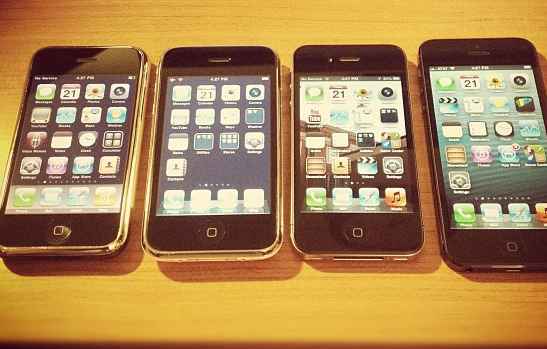The latest figures on smartphone sales show that iPhone sales have gained a little ground in the race against Android. In the landscape of mobile operating systems, Apple’s iOS and the Android operating system continue to dominate the smartphone marketplace.
For Apple, of course, this is nothing but good news. Media heavy breathing about the iPhone losing steam seems to have been premature. And even for Google (and leading Android device vendors) the news is hardly bad. Android remains the smartphone sales leader, commanding more than half the marketplace.
Android and Apple Still Dominate
As Lance Whitney reports at CNET, a study of U.S. smartphone sales by Kantar Worldpanel shows that iPhone sales have regained some of their edge over Android. The Kantar Worldpanel survey compares smartphone sales during April, May, and June of 2012 and 2013. What it finds is that sales of smartphones running Apple’s iOS mobile operating system, otherwise known as iPhones, increased from 39.2% to 42.5% of total smartphone sales, a gain of 3.3%. Meanwhile, Android phone sales dipped a bit, but less than the iPhone gained. Android slipped from 52.6% to 51.5% of the marketplace, a loss of 1.1%.
And in the overall marketplace of these devices, Android and iPhone remain dominant. Indeed, their combined share of smartphone sales increased from 91.8% to 94.0%; all the other contenders thus remains niche players. That said, Microsoft’s Windows Phone more than doubled its sales presence, from 1.9% to 4.0%. Research in Motion’s BlackBerry, on the other hand, took a heavy beating, falling from 4.0% to 1.1%. The even niche-ier “Other” category also lost ground, from 1.3% to 0.9%.
Smartphone Sales Not the Whole Story
The Kantar Worldpanel results specifically focus on smartphone sales, not user market share, and do not include any tablet devices. Nor do the results consider what some industry observers might regard as the most important metric of all: user engagement. Earlier studies have suggested that iOS users (both iPhone and iPad) make much more use of their devices’ Internet capabilities; Android smartphone users have been more likely to use their devices simply as phones, going online with them rarely or not at all.
As more high-end Android phones and tablets become available, this trend may change. For the moment, however, sales figures show that Apple is more than holding its own in the smartphone marketplace. Apple and its mobile products, the iPhone and iPad, have established a market mystique that Android and its welter of device manufacturers have been unable (so far) to fully challenge. Apple had a cult following over the years, but mobility has transformed the cult into a dominant force, reflected by Apple’s remarkable profitability.
At the same time, while Android has established a strong though generic market presence, other operating systems including BlackBerry, Windows Phone, Firefox OS, and others still have only a niche presence. As mobile technology becomes mature and established, this market status quo may continue, at least for the next few years.
Image courtesy of Flickr
[cf]skyword_tracking_tag[/cf]

